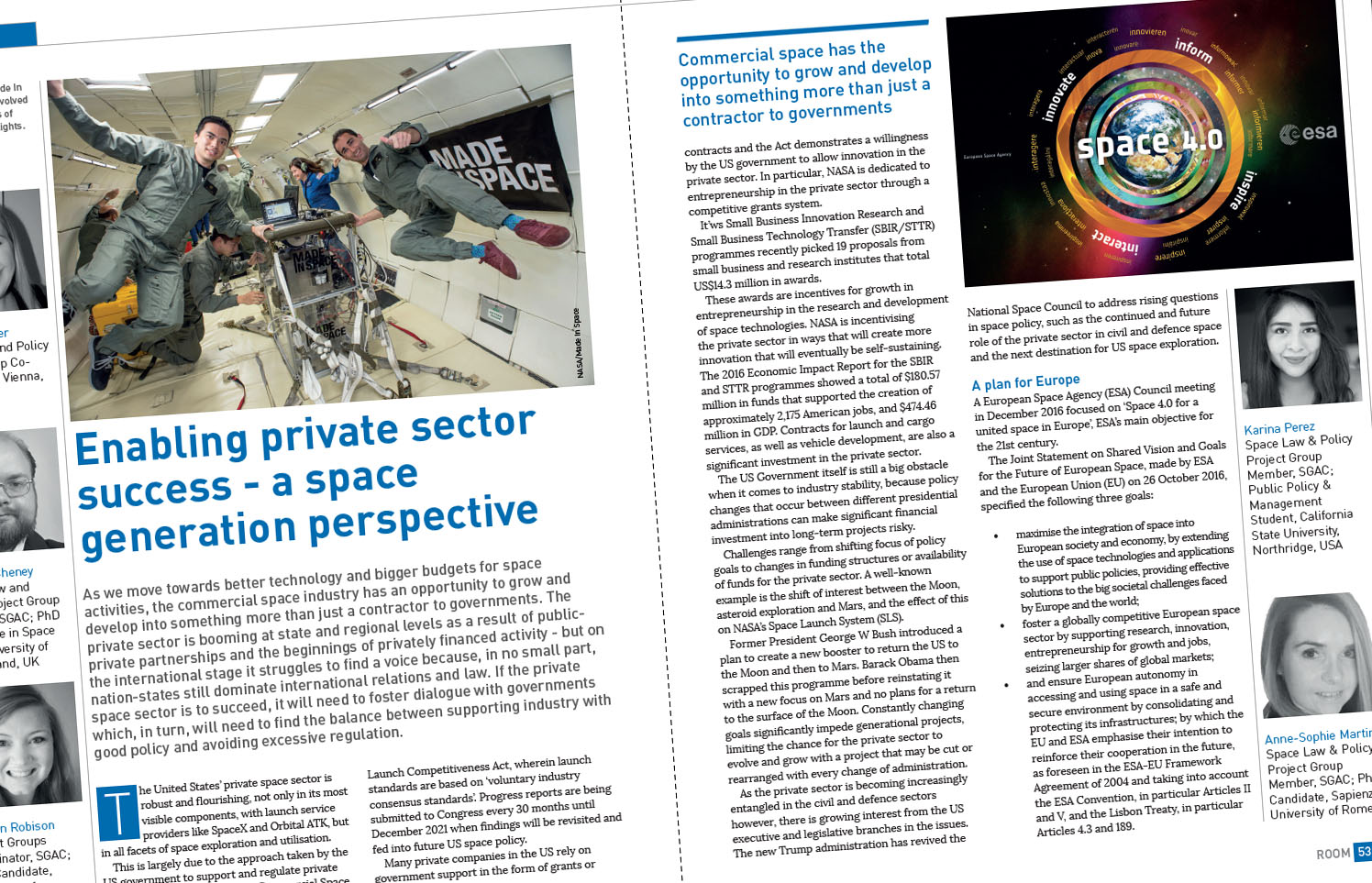Karina Perez is no stranger to success. She’s prepared briefing materials for the House of Representatives’ Committee on Science, Space and Technology. She’s researched legislation for aerospace and start-ups for the Los Angeles Mayor’s Office. As part of the CSUN in D.C. Internship Program, she lived, worked and learned in the nation’s capital.
One day during her time in D.C., Perez was doing research on the space industry and the growing commercial sector within that industry. She came across a paper titled Policy Analysis: Air versus Space, Where do Suborbital Flights Fit into International Regulation? written by Lauren Napier and Thomas Cheney.
Intrigued by the paper and eager to learn more, Perez sent the authors an email with questions about the article and an invitation to chat on the phone.
“I [reached out] and said, ‘Hey, I read your paper. I have a couple of questions. Would you mind if we jumped on the phone or did a Skype call just to talk about it?’” Perez said. “Surprisingly, they answered.”
After talking to Napier for what turned into an hour hour and a half, Napier told Perez to consider joining the Space Generation Advisory Council (SGAC), a global non-governmental, non-profit organization aiming to bring the views of students and young space professionals to the United Nations, space agencies, industry and academia.
Perez joined the council, as well as the space law and policy group, and worked with Napier and Cheney, along with other members of the group. During meetings, they talked about the different projects they were tackling, one of which was writing an article titled Enabling Private Sector Success – A Space Generation Perspective.
Along with Napier, Cheney, and a few other SGAC members, Perez co-authored an article recently published in Room, The Space Journal. Perez worked alongside Ph.D. candidates and was the only undergraduate student on this publication.
Enabling Private Sector Success, which explores the future of the private space sector from the point of view of the millennial generation, gave Perez the opportunity to write about the Commercial Space Launch Competitiveness Act, which she writes, “demonstrates a willingness by the U.S. government to allow innovation in the private sector.”
The article explores “how governments can assure a future for the commercial space sector, and one big takeaway was that the government should have some stability from one administration to the next, especially because space projects tend to be generational,” Perez said.
Wearing a solar system bracelet on her right hand, Perez recalled that her interest in space dates back to when she was six years old. She imagined herself in a time and space machine (similar to the machine in Dr. Who, though she didn’t know it at the time) trying to make sense of her surroundings.
Though her interest in space would always stick around, Perez decided to major in political science as it was aligned with her natural talents.
“People told me I was good at leading and speaking and so I thought ‘I guess I’ll go into politics,’” Perez said. “In college I realized I could do both things. There are careers in politics that deal with space. There is room for me.”
Spending the spring almost three thousand miles away from home was different, Perez said, but also extremely rewarding.
“It’s a completely different culture so it was a bit of a culture shock,” Perez added. “California is so chill and relaxed that I always feel like I have time to take it slow. D.C. is just like ‘go, go, go, go.’ But it wasn’t difficult for me to adjust because that’s the way I am.
“[CSUN in D.C.] was life changing,” she added. “Not only did I find out that I could blend my two passions, I also found a group of people who encouraged me to do so.”
While completing her internship in D.C., Perez lived in the neighborhood of Capitol Hill, three blocks from the Capitol Building. In her 10-minute walk to work, she walked between the Library of Congress and the Supreme Court, which was surreal, she said.
Lawrence Becker, professor of political science and faculty advisor for the CSUN in D.C. program, said Perez excels in and out of the classroom.
“Karina is smart and hard-working in all the ways that make a student great, but what really separates her from others is that Karina is tireless in searching out extra-curricular opportunities to work on science policy — whether it is working for groups, in internships or attending and presenting at conferences,” said Becker.
A strong proponent of diversifying science, technology, engineering and mathematics (STEM), Perez’s tenure in D.C. and her co-authorship on this article are significant to her beyond personal achievement.
“The [policy-making] rooms are homogenous: they’re mostly white and mostly male,” Perez observed. “You rarely see women, and just by being in those rooms, I get to bring in another perspective that typically wouldn’t be there.”
Her passion for policy was sparked when she was in high school, Perez said, as part of the Gay Straight Alliance, a club for which she eventually became president.
“[As president], I attended the Gay-Straight Alliance advocacy camp, and that’s where I got all the information about running a school-wide campaign, school codes and laws that protect students,” Perez said. “When I came back to my campus, I wasn’t just the student running the club, I was the student who had resources for the club and resources for the school.
“That’s when I realized that educating myself is what gave me power and empowerment. That’s when I decided to study politics, because all of that was dependent on policy and politics.”
During her journey, Perez has always kept one goal in mind. “No matter where I go or what I do, I try to give back or try to create something that brings back whatever I learned to the communities I’m a part of.”
This article has been sourced directly from the California State University Northridge website: https://csunshinetoday.csun.edu/politics-and-socie...











